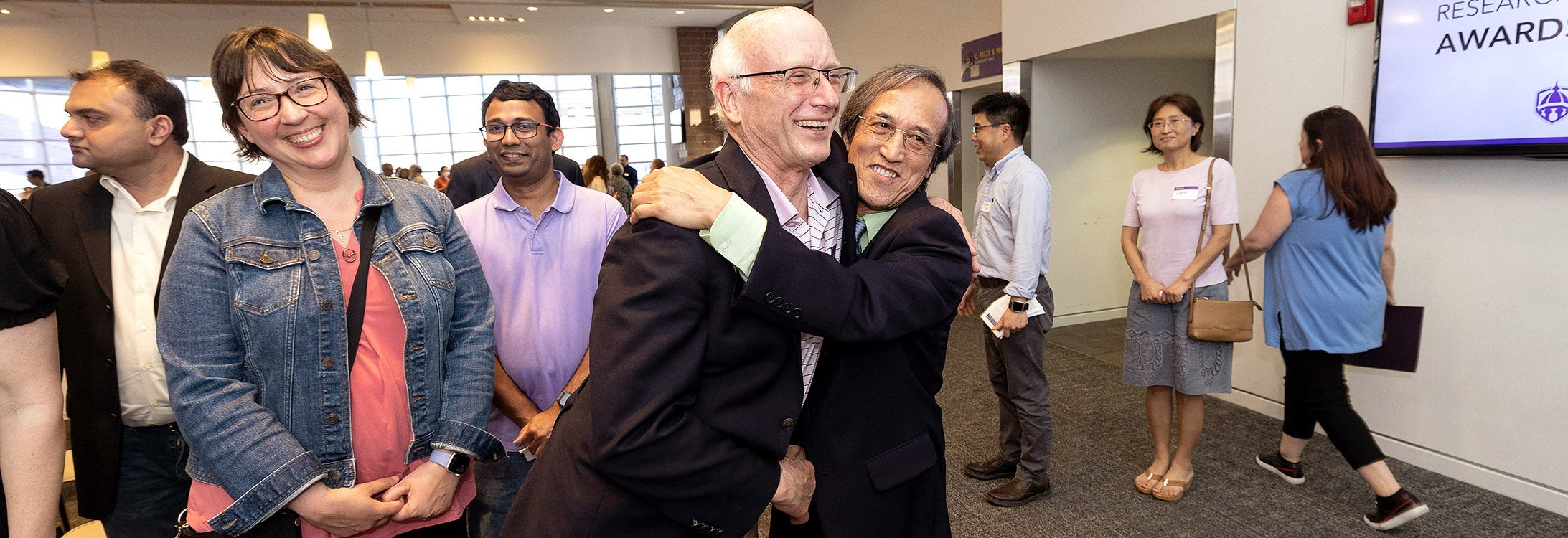LIFETIME OF CARING
Pioneer researcher receives lifetime achievement award
Passionate about his work, his students, his colleagues, East Carolina University and our planet, Yu “Frank” Yang, professor of chemistry is this year’s recipient of the Lifetime Achievement Award for Excellence in Research & Creative Activity.
Yang received his Bachelor of Science and Master of Science at Changchun Institute of Geology in China and went on to pursue his doctorate at Johannes Gutenberg University in Mainz, Germany. He joined the postdoctoral program at the Energy and Environmental Research Center in Grand Forks, North Dakota, where his mentor assigned him a subcritical water extraction research project that led to the focus of his career: subcritical water chromatography.
“My advisor was using carbon dioxide. No one had ever tried water in the extraction process. He assigned me, the first one to do it. We did the work and published the very first paper in subcritical water extraction. It was cited over 600 times — the most cited subcritical water extraction paper,” Yang said.
Wanting to pursue a career in academia and looking for a place to call home, Yang joined ECU in 1997 as an assistant professor. During his time at ECU, Yang built a robust program in the chemistry department back when resources were fairly limited. And, his lab was one of just three in the world of its kind.
Andrew Morehead, chair of the chemistry department, said, “At the time, green chemistry was an emerging or even non-existent field. And he was hired when we really had no startup, when the teaching load was greater for professors. Yet, he managed to build an internationally known research program, really from the ground up.”
As the leading chemist in his field, Yang’s work focuses on eliminating or minimizing the use of toxic organic solvents in extraction, chromatography, environmental remediation and chemical processes — ultimately making chemical extractions and chromatographic separations safer for humans and the environment and more cost effective.
“We have just one planet; that’s our planet. My group, we do our small part and that is to conduct green chemical separation research. We use high temperature, high pressure water (subcritical water) to replace toxic organic solvents in chemical separations like the extraction and chromatography,” Yang said.
Yang explained that eliminating or minimizing organic solvents not only saves money in the cost of purchasing the solvents, but it also saves on the expensive waste disposal process. Sometimes, it costs more to properly dispose of the hazardous wastes containing organic solvents.
A highlight of his career came when Proctor and Gamble called to suggest a collaboration. That collaboration led to the successful development of several green subcritical water chromatography methods for the analysis of ingredients in their products.
“They called me one day out of the blue and asked if I was interested in collaborating with them. My students and I worked very hard applying these methods. We completely eliminated or minimized organic solvents for some of their methods,“ Yang said.
He added, “That’s really what I want to do — industrial application. Because the impact is huge. Based on my 26 years of research, it’s a very conservative estimate that 30% of the industrial methods could be replaced by subcritical water chromatography.”
His hope is to see more industry move to this safer method, though he acknowledges it would likely require a change in regulations and policies.
“The resistance is there. Changing to a new method, it’s a lot of work, time and money. They are not willing to change until the government applies new regulations. Until then, it’s just voluntary,” Yang said.
And, until then, his work continues with no plans to slow down.
“He has these vines all around his office. It was gifted to him by a student, and he said as soon as it wrapped once around his office, he would retire. Right now, it’s wrapped about four times around his office … He’s a very dedicated guy. And, I think that vine is going to keep going around his office,” said Kate Peterson, senior biology major and chemistry minor.
Yang said, “I used to think you get the lifetime achievement award the year before you retire. But, I love what I’m doing. If you love what you do, there’s nothing you cannot achieve. I still want to dream big. I would like to see more progress so I will keep working.“
“I really thank all of my students, my postdocs, fellow scholars, collaborators — both in academia and industry. Without them, this group would not have reached what it has reached. This award really is for everyone,” said Yang
